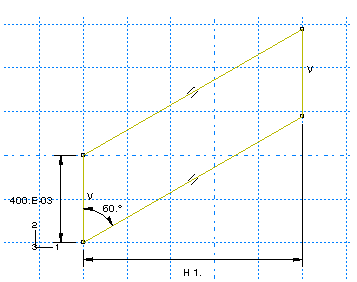Context:
Start
Abaqus/CAE,
and create a three-dimensional, deformable body with a planar shell base
feature. Name the part
Plate, and specify an
approximate part size of
4.0.
In the Sketcher, create an arbitrary rectangle using the
Create Lines: Rectangle (4 Lines) tool.
Delete all constraints automatically imposed by the sketcher (four
perpendicular constraints and one horizontal constraint).
Constrain the left and right edges to remain vertical and the bottom
and top edges to be parallel.
Dimension the left edge by selecting the line and assign it a value of
0.4 m.
Dimension the bottom edge. Select the vertices of the line rather than
the line itself to define a horizontal dimension. Set the horizontal distance
between the vertices to 1.0 m.
Note:
If you were to dimension the line itself, you would control only the
length of the line (in whatever orientation it assumes).
Dimension the angle between the left and bottom edges. Select the left
and bottom edges in succession, and set the value of the angle to
60°.
The final sketch is shown in
Figure 1.
Figure 1. Sketch of the plate geometry (with grid spacing
doubled).

In the prompt area, click Done to finish the
sketch.